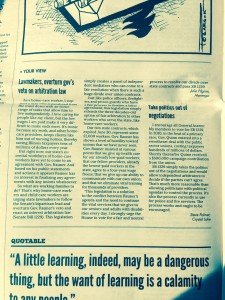Letter: Lawmakers, Overturn Governor Rauner’s Veto On Labor Arbitration Bill, SB 1229
 Julie Piligram, a home care worker in Marengo, Illinois, wrote an amazing guest commentary for the Woodstock Independent, a weekly publication, about why home healthcare and child care providers need Interest Arbitration to resolve state contracts, especially with Gov. Bruce Rauner in power.
Julie Piligram, a home care worker in Marengo, Illinois, wrote an amazing guest commentary for the Woodstock Independent, a weekly publication, about why home healthcare and child care providers need Interest Arbitration to resolve state contracts, especially with Gov. Bruce Rauner in power.
Interest Arbitration Is a Fair Way to Resolve State Contracts
As a homecare worker, I support a man who is paralyzed from the waist down with an entire range of tasks that allow him to live independently. I love caring for people like my client, but the low-wages I am paid make it very difficult to make ends meet. It’s ironic because my work, and other homecare providers, keeps clients like him out of nursing homes thereby saving Illinois taxpayers tens of millions of dollars every year.
But right now, our state’s essential workforce of homecare workers have yet to come to an agreement with Gov. Rauner. And based on his public statements and actions it appears that Rauner has no interest in finalizing any agreements with any unions whatsoever.
So what are working families to do? That’s why homecare workers and child care workers are urging state lawmakers to follow the Senate’s bipartisan lead and overturn Gov. Rauner’s veto and enact an interest arbitration law (Senate Bill 1229). This legislation simply creates a panel of independent mediators who can come to a fair resolution when there is such a huge divide over union contracts.
Just like police officers, firefighters and prison guards who have a fair process to finalize a labor agreement, this legislation simply extends the three-decades-old option of fair arbitration to other workers who serve the state, like home care workers.
Our two state contracts, which expired June 30, represent some 52,000 workers. Gov. Rauner has shown a level of hostility toward unions that we have ever seen. Gov. Rauner insisted at various points that we give up health care for our already low-paid workers; that our fellow providers, already the lowest-paid workers in the state, agree to a four-year wage freeze; that we give up our ability to communicate with our own union; and that we eliminate vital training for thousands of providers.
This legislation is a solution to the conflict between Rauner’s agenda and the need to continue the vital services that we give to our seniors and adults with disabilities every day. I strongly urge the House to vote for a fair and neutral process to resolve our divide over state contracts and pass SB 1229.
Julie Pilgrim
Marengo, IL
